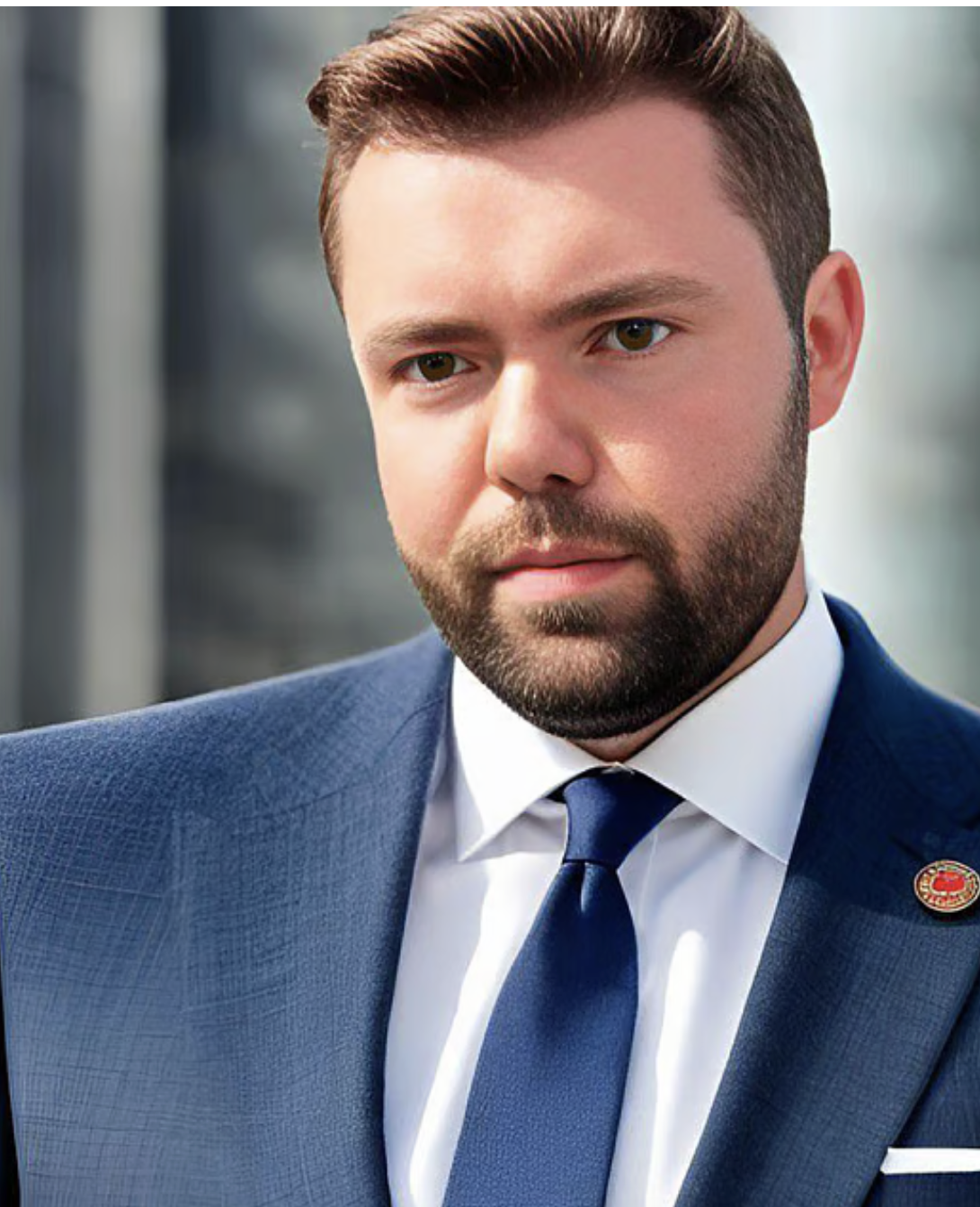If you care about where cities are headed—and what luxury living means in an age of climate pressure, intelligent design, and digital intuition—this is a must-read.
This is not a pitch. It’s a blueprint for what comes next when real estate stops reacting and starts anticipating.
Three years ago, I made what many would call an unconventional leap—out of the server room and into the skyline. After over a decade in tech, scaling platforms and managing infrastructure across Europe and the UAE, I had mastered the mechanics.
But something was missing—something code couldn’t solve. What became clear is this: systems thinking isn’t exclusive to tech. It’s the untapped force in real estate.
I began to see it in design, architecture, and the alchemy of real estate innovation, where structure meets soul and vision becomes form. In 2022, I co-founded Starling Properties in Dubai with a mission to apply intelligent, tech-led frameworks to property development.
Within 18 months, we became one of Dubai’s fastest-growing brokerages. Earlier this year, I sold the company for $50 million—a milestone that unlocked the next chapter: reshaping Toronto’s luxury real estate experience.[1]
Today, I’m proud to introduce Challis Canadian Luxury Developments: a boutique real estate brand inspired by Dubai’s modern elegance and grounded in Canada’s regulatory trust. This isn’t just a new venture—it’s a complete recalibration.
From Code to Concrete—A Technologist’s Lens on Luxury
My story didn’t start with buildings. It began with servers, Linux kernels, and affiliate APIs.
From launching performance marketing platforms as a teenager to leading ops teams across Spain and the UK in my twenties, I was drawn to one thing: the elegance of high-functioning systems. Through companies like SolveAssist and Spectrum Digital, I built software stacks that powered over 600 SMBs and startups.
I also scaled and sold a tech media network under Chasing Media Ltd., becoming CleverBridge AG’s top global affiliate by age 17.
But one truth remains constant across every venture: systems that work seamlessly work universally, whether behind a screen or beneath a foundation.
That obsession followed me into real estate.
At Starling Properties, we embedded automation tools, lead intelligence, and AI-driven asset optimization—not as add-ons, but as operational infrastructure. These systems didn’t just make us faster; they made us outperform traditional brokers in one of the world’s most competitive real estate markets.
This mindset—the drive to build invisible, intelligent infrastructure—is the edge we now bring to Toronto’s luxury market.
Why Canada? Why Now?
Toronto isn’t just attractive—it’s strategic. Canada’s commitment to legal clarity, investor security, and policy-driven growth makes it one of the most stable high-value markets globally. [2]
Greater Toronto Area Real Estate Rankings — April 2025:
| City | Average Price | Median Price | Rank: Most Expensive |
| 1. King | $2.1M | $1.4M | 1st |
| 2. Caledon | $1.7M | $1.2M | 2nd |
| 3. Mono | $1.5M | $1.5M | 3rd |
| 4. Oakville | $1.5M | $1.3M | 4th |
| 5. Aurora | $1.3M | $1.1M | 5th |
| 6. Vaughan | $1.3M | $1.2M | 6th |
| 7. Whitchurch-Stouffville | $1.2M | $1.1M | 7th |
| 8. Richmond Hill | $1.2M | $1.2M | 8th |
| 9. Markham | $1.2M | $1.2M | 9th |
| 10. East Gwillimbury | $1.2M | $1.2M | 10th |
| 11. Uxbridge | $1.2M | $990K | 11th |
| 12. Toronto | $1.1M | $900K | 12th |
| 13. Bradford W. Gwillimbury | $1.1M | $1.1M | 13th |
| 14. Newmarket | $1.1M | $1.0M | 14th |
| 15. Mississauga | $1.1M | $942K | 15th |
| 16. Halton Hills | $1.0M | $933K | 16th |
| 17. Milton | $996K | $973K | 17th |
| 18. Pickering | $967K | $878K | 18th |
| 19. Brampton | $935K | $896K | 19th |
| 20. Ajax | $923K | $865K | 20th |
| 21. Georgina | $803K | $774K | 21st |
| 22. New Tecumseth | $788K | $758K | 22nd |
| 23. Orangeville | $755K | $736K | 23rd |
- Toronto ranks:
- 12th for most expensive out of 23
- 5th for fastest-growing market
- 14th for fastest-selling homes
- 24th for highest turnover (suggesting lowest relative churn)
- Median prices provide a more accurate snapshot where average prices are skewed by high-end sales.
Sustained immigration, strong economic fundamentals, and robust governance fuel its long-term momentum. And unlike speculation-driven cities, Toronto’s value proposition is anchored in utility, livability, and fiscal oversight.
The real opportunity lies in shifting buyer priorities. Residents aren’t seeking extravagance. They’re seeking refined spaces designed for real life—climate-responsive, technology-integrated, and culturally attuned. There’s an appetite for design values imported from global centers like Dubai, translated through Toronto’s unique rhythm.
“Toronto’s real estate market remains active yet measured. With over 7,200 new listings in under a month and a median time on market of 23 days, the city continues to attract steady demand—despite an average price point exceeding $1.1 million. These figures reflect a resilient market where buyers are still engaging, but with more deliberation than urgency.”
— Based on April 2025 Toronto MLS® Housing Data
That’s what led to the founding of Challis Canadian Luxury Developments—to bridge Dubai’s architectural intelligence with Toronto’s design restraint and build for how luxury is actually lived.
What We’re Building in Toronto
Narrow Victorian row houses with peaked gables in Toronto. (Photo: Shutterstock)
Project 1: 40-Unit Luxury Townhouse Community | Midtown Toronto
Urban families want more than square footage. They want privacy, light, sustainability, and seamless integration with the city. Our first project delivers that through 40+ townhomes, each between 2,400 and 3,000 sq. ft., built to exceed the expectations of today’s high-income buyers.[3]
Design Features:
- Smart multi-zone climate control systems with behavioral learning
- Full-home radiant heated flooring, enhancing energy efficiency
- Miele-equipped kitchens with zero-waste composting and induction tech
- Rooftop terraces with privacy screens and seasonal adaptability
- Acoustic zoning that separates rest and social areas without sacrificing flow
Target Resident: Households earning $400K+ seeking long-term ownership within city limits, without compromising comfort, aesthetics, or privacy.
Project 2: Dual G+4 Mid-Rise Complexes | North Toronto
Toronto’s discerning buyers no longer want high-rise living. Towers sacrifice light, quiet, and human-scale design. Our two G+4 residential complexes create an elevated alternative—smaller footprints, larger impact.
Specifications:
- 10’6” ceilings and full-height windows for optimized daylight and passive heating
- Touchless elevators, keyless access, and voice-controlled unit entry
- Wellness-focused amenity floors including meditation suites and infrared therapy
- EV-ready underground parking with individual storage lockers
- LEED Gold certification in progress with 85% regionally sourced materials
Why it works: Boutique mid-rise developments maintain the intimacy of townhomes while supporting density and resale value. With 22 units per building, these structures feel personal—not institutional.
Project 3: Future GTA Hotel Concept
Image: Dubai’s Hospitality Sector – Market Performance in H1 2024
We’re developing a hospitality-forward model that mirrors Dubai’s service precision, adapted to Toronto’s pace. This boutique hotel concept reimagines luxury through wellness, data, and modularity.[4]
Early-stage Features:
- Digital concierge and adaptive service layers powered by guest behavior profiles
- Extended-stay suites built for hybrid work—acoustic isolation + high-speed mesh networking
- Cryotherapy, hydrotherapy, and low-sensory recovery lounges
- Net-zero energy systems targeting LEED Gold or higher
Strategic Goal: Meet the growing demand for hospitality that anticipates, not reacts—to the needs of global travelers, remote professionals, and wellness-first tourists alike.
Designing with Data: What the Market Is Really Telling Us
Informed design doesn’t start with renderings. It starts with buyer behavior.
Sotheby’s 2024 Market Insight Report reveals:
- Toronto home sales above $4M rose 18% year-over-year
- Buyers rank smart home tech and sustainability over square footage or brand finishes
- Boutique low-rise and mid-rise builds deliver stronger resale velocity and higher owner satisfaction [5]
We don’t design for preferences expressed on surveys. We design for behaviors proven in transactions. That’s why every Challis development is structured around buyer priorities—privacy, performance, and long-term livability.
Case Study: Palm Jumeirah Villa Transformation
- Pre-renovation valuation: $5.6M USD
- Post-renovation valuation: $9.1M USD
- Time on market: 0 days
- Recognition: UAE Architectural Showcases, 2023
This was more than a high-end flip. It became a test case for intentional, integrated living:
- Voice-controlled lighting and security
- Carbon-aware HVAC and energy analytics
- Reclaimed stone and low-impact finishes
- Acoustic privacy zones and adaptive room lighting based on usage
The result wasn’t loud—it was quiet luxury, fully responsive and energy-smart. That same principle now guides our projects in Toronto: seamless performance, low-profile sophistication, and emotional durability.
What Buyers Are Actually Demanding
Luxury has evolved. It’s no longer defined by brand names or inflated scale. It’s defined by how a space performs—ethically, technologically, and experientially.
What they want | How we deliver:
| Expectation | Challis Solution |
| Smart tech without clutter | Whole-home neural systems adapting to daily routines |
| Privacy integrated with openness | Acoustic zoning + seamless circulation between private and public areas |
| Sustainable materials with purpose | FSC-certified hardwood, reclaimed wood, low-VOC paints, radiant heating from clean energy |
| Trust in purchase | Multi-tiered warranties on structure, tech systems, and finishes |
| Cultural and climatic alignment | Architecture rooted in Canadian living patterns—not imported templates |
We don’t treat these as luxury perks. We treat them as the new minimum. Our work builds beyond them.
From Smart Homes to Smart Communities
Luxury, in its highest form, isn’t indulgent—it’s intelligent. We’re now developing frameworks for systems-level thinking across entire neighborhoods:
- Shared solar microgrids
- Intelligent traffic and parking flows within residential zones
- Community wellness infrastructure integrated into urban layouts
- Regenerative material supply chains that adapt to emissions tracking
What we’re shaping isn’t just real estate—it’s resilient, self-learning ecosystems designed for long-term value and human wellbeing.
Final Thoughts
From the outside, this may look like a pivot—from tech to property, from Dubai to Toronto. But the mission hasn’t changed. It’s always been about building systems that feel effortless, function flawlessly, and last with integrity.
At Challis Canadian Luxury Developments, we don’t just construct residences. We prototype how intelligent urban life can look and feel—project by project, neighborhood by neighborhood.
When systems are smart, spaces serve us better. When design listens, homes become humane. And when sustainability is structural, not symbolic, we move closer to real progress.
About the Author
I’m a systems thinker turned real estate developer. After more than a decade building tech infrastructure across Europe and the UAE, I co-founded Starling Properties in Dubai—where we combined AI-driven frameworks with architectural precision to reimagine what luxury real estate could be.
In under two years, we scaled, dominated, and exited with a $50M sale. Now, I’m channeling that same systems mindset into Toronto’s luxury market through Challis Canadian Luxury Developments.
References
[1] Tribune India. (2025, January 19). Global Architect & Builder Awards 2025: Dubai Celebrating Excellence in Architecture & Construction. Retrieved from https://www.tribuneindia.com/news/business/global-architect-builder-awards-2025-dubai-celebrating-excellence-in-architecture-construction/
[2] Zolo Real Estate Trends. Toronto Housing Market Report – April 2025. Retrieved April 2025 from https://www.zolo.ca/toronto-real-estate/trends
[3] CTV News. (2025, April). One-third of Canadians no longer want to live in urban centres, survey finds. Retrieved from https://www.ctvnews.ca/toronto/article/one-third-of-canadians-no-longer-want-to-live-in-urban-centres-survey-finds
[4] Cavendish Maxwell. (2024, H1). Dubai’s Hospitality Sector: Market Performance in H1 2024. Retrieved from https://cavendishmaxwell.com/insights/reports-and-whitepapers/dubais-hospitality-sector-market-performance-in-h1-2024
[5] Move Smartly. (2025, March). Monthly Report: Greater Toronto Area Housing Market Insights – March 2025. Retrieved from https://www.movesmartly.com/monthly-report-2025-march







